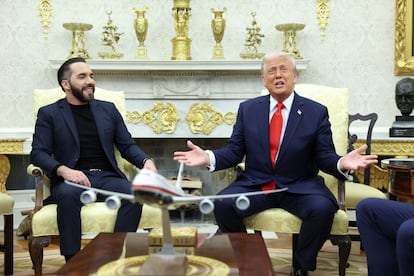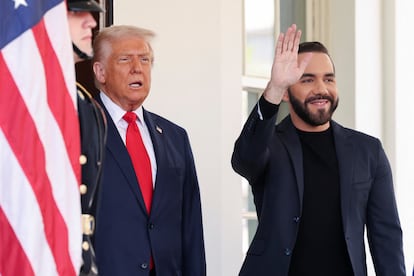Bukele tells Trump he will not return Salvadoran migrant mistakenly detained in Cecot prison
The president of El Salvador denies in an Oval Office meeting that he has the power to return Kilmar Abrego García, wrongly deported to the maximum-security facility for gang members


El Salvadoran President Nayib Bukele visited the White House on Monday amid a standoff between judges and the Trump administration over the fate of Kilmar Armando Abrego García, a resident of Prince George’s County, Maryland, near Washington. He was mistakenly deported to El Salvador on the flight the government used to send more than 250 men, allegedly gang members, to be prosecuted and imprisoned without due process in the Terrorism Confinement Center (Cecot), one of the most feared prisons on the continent.
When reporters asked President Donald Trump about Abrego García’s fate in the Oval Office, he deferred to Attorney General Pam Bondi, who said: “That’s up to El Salvador if they want to return him. That’s not up to us. The Supreme Court ruled that if El Salvador wants to return him… we would facilitate it: meaning, return a plane.” Stephen Miller, architect of the U.S.’ harsh immigration policy, added: “He’s a citizen of El Salvador. So it’s very arrogant, even, for American media to suggest that we would even tell El Salvador how to handle their own citizens.” Miller also recalled that Trump included the Salvadoran gang MS-13, of which it alleged Abrego García was a member, on his list of terrorist groups.

“How can I smuggle a terrorist into the United States?”
Which led to Bukele’s response to the question of whether he would facilitate Abrego García’s return: “The question is preposterous. How can I smuggle a terrorist into the United States? I don’t have the power to return him to the United States.” Bukele also expressed his openness to receiving more deportees.
For receiving and imprisoning Abrego García and the rest of those deported by the Trump administration under the Alien Enemies Act — a 1798 mechanism resurrected by the current administration and which grants the president extraordinary powers during times of conflict to expel citizens from countries at war with the United States, or attempting to invade it — the Salvadoran government will earn around $6 million a year, according to the Salvadoran president himself. Trump claims, without evidence, that the Tren de Aragua criminal group controls Nicolás Maduro’s regime in Venezuela and is attempting to attack the U.S. from within.
The Alien Enemies Act has only been invoked three times in U.S. history, each during wartime: once in 1812, again during World War I against citizens of the Austro-Hungarian Empire, and finally during World War II to intern Japanese, German, and Italian Americans in concentration camps.
Last Thursday, the U.S. Supreme Court ordered the Trump administration to “facilitate” the return of the 29-year-old construction worker, who had been in the country for 14 years, is married to an American woman, and has three children. In 2019, he was accused of belonging to MS-13, but authorities failed to prove those allegations. The Supreme Court rejected the excuse that the White House, which has admitted to “an administrative error” in Abrego García’s deportation, had no way to bring him back.
Bukele arrived in the West Wing at around 11:30 a.m. He was received with honors. Trump greeted him at the door and shook his hand. The two then went to the Oval Office, where they held a bilateral meeting. Bukele is not only the first Latin American president to be received by Trump; he is also the second world leader to arrive at the Oval Office without a tie. He was wearing a blue suit and something that looked like a black T-shirt, but no reporter asked, as was the case with Ukrainian President Volodymyr Zelenskiy, why he was “desecrating” such a solemn place in casual attire. Afterwards, both were scheduled to attend a lunch organized in honor of the visitor.
Trump praised Bukele, a “very young man” and “an amazing president.” “I want to thank you for the great job you’re doing,” he told his interlocutor. The latter replied: “We’re very willing to help. You have a big problem, a terrorism problem.” Bukele boasted of having turned the “murder capital of the world into the safest country in the Western Hemisphere,” which is how Washington refers to the American continent. “They say we’ve imprisoned thousands of people, I like to say that we actually liberated millions,” the Central American leader added. “Do you think I can use that?” Trump asked.
Shortly before Bukele’s arrival, the White House press office sent a statement titled “No Safe Harbor for Illegal Immigrant Criminals Under President Trump,” announcing that the two presidents were meeting today to “showcase their historic partnership to make the world a safer place.”
“Thanks to the two leaders, scores of violent illegal immigrant killers, rapists, gang members, and other sick criminals have been swiftly taken off our streets.,” the statement added, going on to list a “tiny sample of the cold-blooded criminals deported to El Salvador:” four Venezuelans and two Salvadorans who, according to the White House, have ties to Tren de Aragua or MS-13. The statement also included the names of 16 other men, suspected criminals, deported to other countries.
Sign up for our weekly newsletter to get more English-language news coverage from EL PAÍS USA Edition
Tu suscripción se está usando en otro dispositivo
¿Quieres añadir otro usuario a tu suscripción?
Si continúas leyendo en este dispositivo, no se podrá leer en el otro.
FlechaTu suscripción se está usando en otro dispositivo y solo puedes acceder a EL PAÍS desde un dispositivo a la vez.
Si quieres compartir tu cuenta, cambia tu suscripción a la modalidad Premium, así podrás añadir otro usuario. Cada uno accederá con su propia cuenta de email, lo que os permitirá personalizar vuestra experiencia en EL PAÍS.
¿Tienes una suscripción de empresa? Accede aquí para contratar más cuentas.
En el caso de no saber quién está usando tu cuenta, te recomendamos cambiar tu contraseña aquí.
Si decides continuar compartiendo tu cuenta, este mensaje se mostrará en tu dispositivo y en el de la otra persona que está usando tu cuenta de forma indefinida, afectando a tu experiencia de lectura. Puedes consultar aquí los términos y condiciones de la suscripción digital.








































